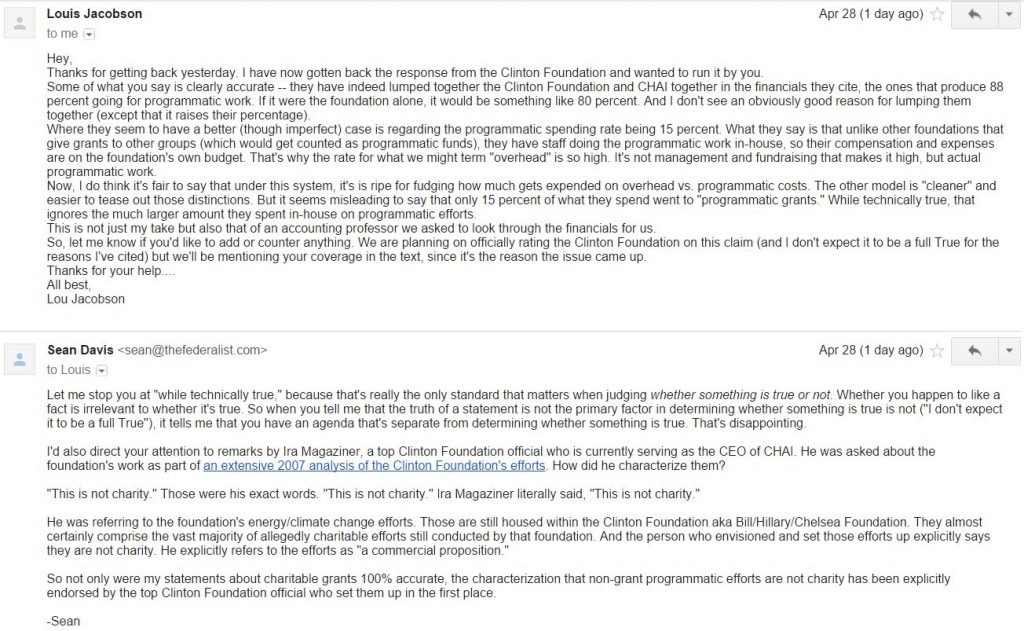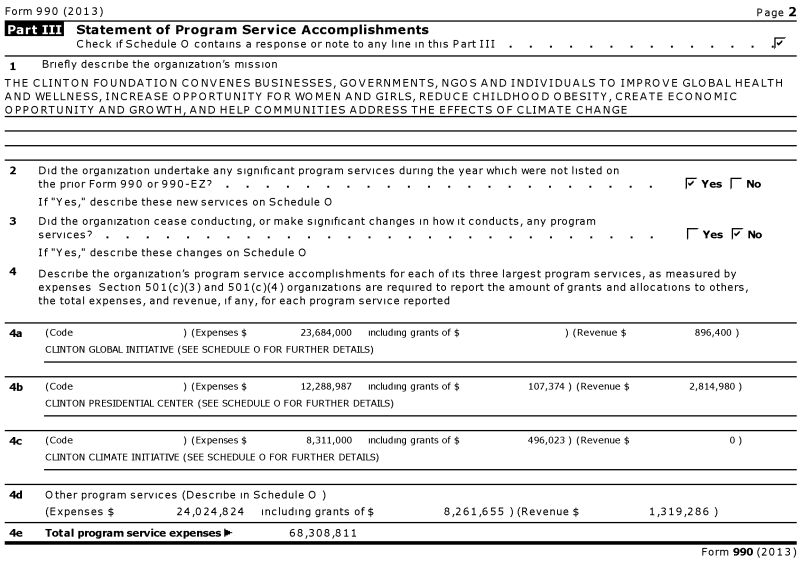
If you like liberal ideologues who label inconvenient facts as “false,” then you’ll love PunditFact. Why? Because PunditFact just declared that a demonstrably true fact was false because, according to PunditFact, the factual claim “ignores critical facts that would give a different impression.” Facts are strange that way. They do tend to give an impression of the truth, even if some people find that impression discomfiting.
It gets more embarrassing than that, though. In an unsolicited April 28 e-mail to me, PunditFact author Louis Jacobson told me unequivocally that the demonstrably factual claim he was examining was “clearly accurate” and “technically true.” But today, Jacobson declares, that fact is suddenly “Mostly False.”
Last month, I wrote a meticulously researched article examining several years’ worth of financial data from the Clinton Foundation. What I found was that of the roughly $500 million raised by the Clinton Foundation from 2009 through 2012, barely 15 percent of its expenditures were charitable grants to other organizations. Rush Limbaugh repeated the claim on his radio show several weeks later, and PunditFact took it upon itself to determine whether the obviously factual statement, supported by voluminous financial documentation, was indeed factual.
Here is the precise statement I made in my initial analysis that Limbaugh quoted:
Between 2009 and 2012, the Clinton Foundation raised over $500 million dollars according to a review of IRS documents by The Federalist (2012, 2011, 2010, 2009, 2008). A measly 15 percent of that, or $75 million, went towards programmatic grants.
Earlier this week, I wrote two more articles detailing the Clinton Foundation’s finances. The first, which relied entirely on tax return filings provided by the Clinton Foundation, showed that the organization spent less than 10 percent of its 2013 budget on charitable grants. The second article, which examined the many different non-profit entities managed by the Clinton, quoted Clinton Foundation executive Ira Magaziner, who said of the tax-exempt group’s activities, “This is not charity. This is a commercial proposition.”
Those two sets of facts — the underlying financial information provided to the IRS by the Clinton Foundation and the testimony of its own executive — are crucial in determining whether the Clinton Foundation is primarily engaged in charitable activities. When a Clinton Foundation executive, especially one who serves as CEO of the Clinton Health Access Initiative, openly brags that his organization’s efforts are commercial rather than charitable in nature, I’m inclined to believe him.

The “Mostly False” declaration of PunditFact’s Louis Jacobson is even more fascinating given that he was not aware until I told him so that the Clinton Foundation annual report and the Clinton Foundation’s tax filings are not apples-to-apples comparisons. A researcher familiar with the subject material he was researching would have known that, but Jacobson did not. The annual report lumps together numerous distinct non-profit entities, whereas the tax filings were related to a single tax-exempt entity, the Clinton Foundation, also referred to as the Bill, Hillary, & Chelsea Clinton Foundation.
“I didn’t re-run your calculations, but I entirely agree that the 990s paint a different picture than what the foundation says (such as in its annual report),” Jacobson told me in his initial e-mail to me. “It’s such a yawning gap that there has to be some sort of explanation, and that’s what I’m looking for.”
I gave Jacobson multiple explanations as to the source of that “yawning gap.” We’ll set aside for the moment that a decent journalist should’ve been able to figure out those gaps on his own by simply examining the annual report and the tax filings. We’re not talking rocket science here. Jacobson is not that journalist. Jacobson’s issue wasn’t with a lack of explanations. His issue was that the actual explanations didn’t jibe with the story he wanted to tell.
While it is true that Jacobson clearly admitted to me via e-mail that my research findings were “technically true,” I unfortunately cannot say the same about several other claims he attempted to make. For example, Jacobson told me that “it seems misleading to say that only 15 percent of what they spend went to ‘programmatic grants.'” Actually, it is grossly misleading and factually inaccurate to say anything but that. It is a simple, demonstrable, indisputable fact based entirely on publicly available financial filings. Here, for example, is how the Clinton Foundation’s 2013 tax filings list the expenditures:

How are the expenditures categorized on the IRS filings? As grants/program service expenses. It is impossible to be inaccurate or misleading when you are literally quoting figures taken directly from an organization’s tax records.
The problem here is not one of facts or accuracy, but ideology. Jacobson simply doesn’t like the implications of the fact that the Clinton Foundation spent less than 10 percent of its budgets on charitable grants in 2013. He doesn’t like the fact that the two single largest “charitable” initiatives of the Clinton Foundation — by its own admission — are the Clinton Presidential Library, which exists solely to put a positive spin on the 42nd president’s term in office, and the Clinton Global Initiative, which the New York Times characterized as a “glitzy annual gathering of chief executives, heads of state, and celebrities.” If hanging out with celebrities at glitzy dinners is the height of charity, then it’s time to beatify the Kardashian sisters.

“[T]he foundation says it does most of its charitable work in-house,” Jacobson writes, “and it’s not credible to think that the foundation spent zero dollars beyond grants on any charitable work, which is what it would take for Limbaugh to be correct.”
Actually, no. No. That’s not what it would take for Limbaugh (and, by extension, The Federalist) to be correct. We and he stated that over a four-year period, the Clinton Foundation spent only 15 percent of its budget on charitable grants. Do you know what it takes for that statement to be correct? The demonstration that over that four-year period the Clinton Foundation spent only 15 percent of its budget on charitable grants. That’s it. Nothing else is required. Unless, of course, your goal is to rehabilitate the Clintons rather than to broadcast actual facts.
Now, I don’t know why Jacobson didn’t spend any time examining where these “in-house” charitable expenditures actually ended up. I don’t know why he didn’t ask if spending millions on Bill Clinton’s personal library should really count as charity. I don’t know why he didn’t dig in and see if flying on private jets and eating fancy meals with celebrities were activities that are truly charitable in nature. After all, that’s where a huge chunk of this “in-house” charity money actually went.
It could be that he lacks the basic capacity to read and analyze a simple financial statement. It could be that he viewed highly compensated Clinton payroll employees (charity beneficiaries according to Jacobson’s analysis) as independent arbiters of what constitutes charity and what constitutes lily-gilding tax-exempt excess. It could be that he didn’t care at all about the actual, demonstrable facts and was instead far more interested in defending the Clintons, no matter the cost. Fortunately, Jacobson gives us a hint as to his intent.
According to Jacobson, the notion that all non-charitable grant money must be considered as “in-house” charity expenditures “depends on trusting the Clinton foundation’s characterization of its expenditures.” You don’t say. Well, luckily for us, the Clinton Foundation doesn’t have any history at all of deliberately mischaracterizing its financial information or deliberately hiding the source of millions of dollars worth of foreign donations.
So what we have from Jacobson is not a fact check, but an implication check. He likes the implications of agreeing with people on the Clinton payroll, so he trusts them, even when actual facts, history, and common sense contradict their assertions. Jacobson does not like the implications of facts that show the Clintons and their allies in a poor light, so he declares them to be false.
This is not journalism. This is not fact-checking. This is pathetic demagoguery, and a remarkably unimpressive display of it at that.
“Let me stop you at ‘while technically true,'” I told Jacobson via e-mail, “because that’s really the only standard that matters when judging whether something is true or not. Whether you happen to like a fact is irrelevant to whether it’s true. So when you tell me that the truth of a statement is not the primary factor in determining whether something is true [or] not (“I don’t expect it to be a full True”), it tells me that you have an agenda that’s separate from determining whether something is true. That’s disappointing.”
It’s also vintage PunditFact.
[UPDATE: Phil Kerpen notes on Twitter that PunditFact and PolitiFact are funded by a large and active Clinton Foundation donor and partner, a fact PunditFact conveniently failed to disclose in its defense of the Clinton Foundation.]
@seanmdav They totally disclosed that they are funded by Ford Foundation, a Clinton Foundation donor, right?
Phil Kerpen (@kerpen) April 29, 2015









